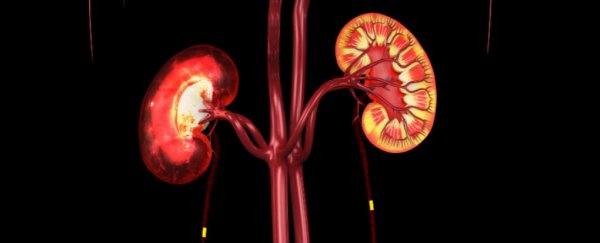For more than a century, scientists have tried to transplant the kidneys of animals into humans.
For more than a century, they have failed to get those organs functioning.
Now, researchers at the University of Alabama at Birmingham are claiming a first.
They have taken the kidneys of a genetically modified pig and successfully transplanted the organs into a brain-dead patient with the permission of his family.
Scientists have tried this before with some success, but what sets the current case study apart is that the pig kidneys quickly made urine and cleared the patient's body of creatinine.
Creatinine is a broken down part of a waste product produced mainly by our muscle cells and it can only be removed from our bodies via our kidneys through urine. So these are crucial measures of kidney function required to sustain life.
No one had succeeded in providing reliable measurements to both before.
When the organs of one species are transplanted into another, it's known as 'xenotransplantation'.
Historically, these surgeries have mostly failed, because the human immune system attacks the foreign tissue, even with immunosuppressive drugs. But if that animal organ is genetically modified to trick the human immune system into accepting it, scientists could theoretically prevent rejection.
That proof of principle has now been carried out in a hospital with astonishing success. According to Toby Coates, a clinician scientist at the University of Adelaide who was not involved in the current case, the new xenotransplant was made successful using a 'key advance' in genetic modification.
The removal of four pig genes and the insertion of six human genes, he says, helped "prevent coagulation and 'humanize' the pig kidney".
These human-like pig kidneys were functional for a week in the patient's body, but researchers now need to test whether these kidneys are temporary 'bridges' or 'destination therapies' for those with end-stage kidney disease.
Either scenario would be extremely welcome. Today, in the US, roughly 40 percent of patients waiting for a kidney transplant die within five of years of being listed.
Each year, only 25,000 people receive a kidney transplant, and yet the nation is home to more than 800,000 patients with end-stage kidney disease.
Unfortunately, one successful xenotransplant isn't enough to declare this solution safe or effective.
A few years ago, when some of the same scientists transferred two kidneys from a pig with 10 genetic modifications into a different brain-dead patient, it didn't go as well. The patient's body did not reject the organs, but the kidneys did not clear did not clear enough creatinine to reduce levels in the patient's blood or be detected in the urine, either.
Some scientists remain skeptical that xenotransplants in brain-dead patients will translate to living patients. But extending these experiments to the latter group remains highly contentious.
If scientists were to start doing that, kidney xenotransplants would be the safest bet, as these organs can be removed from the body without causing death if immune rejection starts.
Advocates for xenotransplantation research argue that we should tread cautiously but that these are potentially life-saving steps worth taking.
"Although in the early phase, this pilot study provides hope for the over 15,000 Australians on dialysis who could benefit from a kidney transplant," Coates says, "and potentially helps overcome the shortage in human donor kidneys."
The letter was published in JAMA Surgery.
